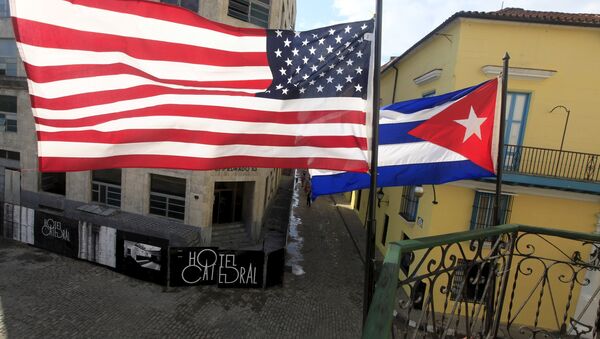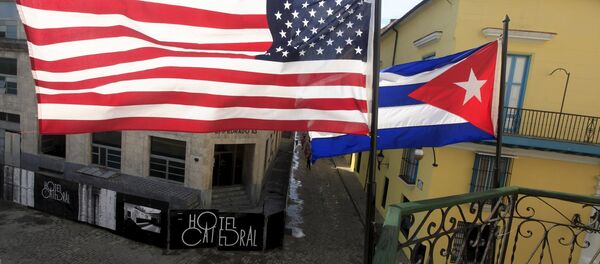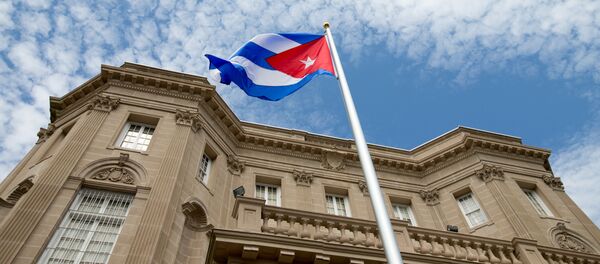WASHINGTON (Sputnik) —Analysts say that the Trump administration risks setting back US relations with Cuba for decades if it shuts down the US Embassy in Havana.
US Secretary of State Rex Tillerson said on Sunday that the US government was considering closing its embassy in Havana, Cuba. "We have it under evaluation," Tillerson said on CBS's "Face the Nation."
CLOSING US EMBASSY IN CUBA WOULD THREATEN RETURN TO COLD WAR ERA
The United States is considering closing its embassy in Havana reportedly because of an alleged sonic attack on US and Canadian diplomats in Cuba in 2016.
The State Department said the incidents left at least two US diplomats with such serious health problems that they needed to be brought back to the United States for treatment. CBS News also reported that some of the US diplomats were diagnosed with traumatic brain injuries.
However, historian and Cuba affairs analyst Keith Bolender warned on Monday that any such action would be a "terrible" error on the part of US policymakers.
"I have heard about the possibility of closing down the American embassy in Cuba," he said. "I think it would be a terrible mistake and put back relations to some of the worst times of the Cold War."
Closing the US embassy could not be seen as an isolated move but instead would have very negative repercussions across the entire spectrum of US-Cuban relations, Bolender predicted.
Such a move would definitely have a very damaging effect on all areas of potential cooperation between the United States and Cuba, Bolender cautioned.
"It would make it harder for the Cubans to trust the American government, and may have a negative effect on the Cuban embassy in Washington. Let's hope it doesn't happen," he said.
US EMBASSY CLOSURE POSSIBLE, BUT UNLIKELY
However, Bolender suggested that the closure was still unlikely to bb happen, despite Tillerson’s comments on Sunday because the dynamic of improving US-Cuban relations was already so far advanced.
"I don’t think it will happen because there are just too many aspects of the recent opening between the US and Cuba to consider. More Americans than ever are coming to Cuba, there are American businesses operating in Cuba," he explained.
Also, although the Trump administration has now been in office for almost eight months, it has so far undertaken no concrete action to reverse the positive initiatives previously implemented under past president Barack Obama, Bolender recalled.
"Although Trump did turn back a couple of elements, the majority of the new regulations towards normalizing relations that were instituted by Obama and Raul Castro in 2014 remain in place," he said.
"Regarding Trump's Cuban policy, there was an expectation that he would reverse most of Obama's openings, that's what he threatened. He didn't, leaving the vast majority of the new regulations in place," he said.
President Donald Trump had been much more restrained in office than his 2016 campaign rhetoric had suggested, and therefore Trump was unlikely to take the radical step of ordering the embassy in Havana to be shut down, Bolender suggested.
"So while his attitude has been much more anti-Cuban that the Obama administration, I don't think he'd take the step to close the embassy. He could have done that when he announced his new Cuban policy, but he did not," he said.
Shutting down the Havana facility would also cause serious problems for Americans visiting or doing business in Cuba, Bolender pointed out.
"To close the embassy would prevent Americans in Cuba to any embassy services, and that seems a very drastic step to take," he said.
However, there was no evidence to suggest that the Cuban government had been involved in any such incident, Bolender noted.
"This whole incident is based on the apparent sonic attack on American and Canadian diplomats. There is no evidence the Cuba side was involved, even the Americans admit this, and so to take such a response seems unwise at this time," he said.
The Cuban government has always expressed its willingness to co-operate in any investigation, and State Department officials have publicly admitted that, Bolender recalled.
American University Professor of Government William Leogrande agreed that shutting down the US embassy in Cuba would be an illogical and counterproductive response to the incident involving the US and Canadian diplomats.
"Closing the US embassy in Havana because of the unexplained injury to US and Canadian diplomats makes no sense. It is unlikely that Havana is responsible for intentionally harming diplomatic personnel and the embassy serves important US interests," he said.
The Cuban Foreign Ministry has ruled out any Cuban involvement in the alleged attacks.
State Department spokesperson Heather Nauert said that an investigation into the incident was underway, saying the Cuban government has an obligation to protect US diplomats.
Moreover, Havana has reiterated it was willing to cooperate with the United States to clarify the situation.




